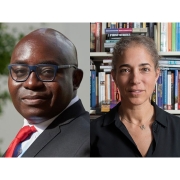Gift Creates a Lab for the Digital Humanities at Penn

A $7 million gift from Penn Arts and Sciences Overseer Michael J. Price, W’79, and his wife, Vikki, will establish the Price Lab for the Digital Humanities. The centerpiece of the new Penn Arts and Sciences strategic initiative Humanities in the Digital Age, the Price Lab will provide the technological hardware and technical support staff necessary for a robust program that reaches across the University.
“We are extraordinarily grateful to Vikki and Michael Price, who share our vision for the transformative effect the digital humanities will have on Penn and higher education,” said Amy Gutmann. “The Price Lab for the Digital Humanities will provide the infrastructure needed to disseminate information and to address questions about history, art, and culture in radically new ways. Through the digital world, we will significantly increase our academic reach and educational access for those in the Penn community and around the globe.”
“This is a huge moment of change and opportunity in the humanities,” said Penn Arts and Sciences Dean Steven Fluharty. “With the digital humanities, we will not only produce new knowledge but new ways of knowing, and new forms to show the outcomes and results. The Price Lab will make us a leader in this revolution.”
“Digital humanities” is an umbrella term for the proliferation of digital and computational technologies that are being applied to scholarship across higher education and transforming the way humanists work. The digital humanities encompass tools ranging from computers that read massive amounts of digitized writing to facilitate the analysis of texts and detect previously invisible patterns, to geographic information systems (GIS) that present complex histories in the form of interactive maps and 3-D modeling technologies which can produce immersive re-creations of archaeological sites and artifacts.
Michael Price said, “I was really attracted to the strategic initiative in the digital humanities because the digitization of rare manuscripts, art, and artifacts leads to the democratization of learning,” along with increased possibilities for research, collaboration, and trend analysis. He noted that by “allowing the humanities community to increase access to materials and resources, and encouraging integration of knowledge,” the digital humanities initiative reflects the spirit of the Penn Compact 2020.
The Price Lab for the Digital Humanities will evaluate, incubate, and support complex interdisciplinary projects in the digital humanities conducted by undergraduate, graduate, and faculty research participants. The lab will become home to full-time technical support staff with the computational skill sets needed to successfully complete these important projects, provide training for the project participants, and manage the required technologies.
“We’ll have a central place where we can explore exciting new areas of interdisciplinary convergence, using the digital humanities to widen the understanding of what the humanities are and why they matter,” said James English, John Welsh Centennial Professor of English, director of the Penn Humanities Forum, and creator of the Digital Humanities Forum.
Michael Price is Senior Managing Director of corporate advisory business and leader of the Technology and Telecom groups at Evercore Partners, a leading international investment banking advisory firm. At Penn, the Prices have also contributed to the Neural and Behavioral Sciences Building, the Singh Center for Nanotechnology, the School of Arts and Sciences Board of Overseers chair currently held by Rebecca Bushnell, and the Arts and Sciences Annual Fund. Additionally, they are members of the Men and Women of Pennsylvania, a society for donors who give over $2 million to support undergraduate scholarships.





